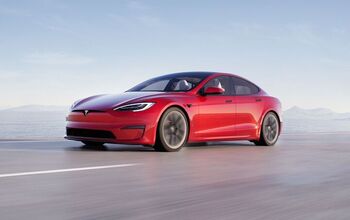QOTD: Why Are People So Wrong?

It’s infuriating. Here I am, sipping a tall can of dodgy suds (I poured it into a glass for a modicum of elegance), and all around me people are buying vehicles I wouldn’t be caught dead in — and using their own hard-earned cash to do it, the buggers…
Corey Lewis is one of those culprits, so last weekend I got in the car, drove down to southern Ohio, and gave him a piece of my mind — if you catch my drift — for having the unmitigated gall to desire the wrong used cars. Let’s just say you won’t be seeing him in public for a while.
It never ends with these people!
If you haven’t guessed, I’m being facetious. Corey is just fine. He’s relaxing comfortably at home right now, free to pursue a life of religious fulfilment. No, what got me started on this tangent was a tweet from a very online automotive journalist who, in a fit of frustration, lamented that “consumers have no idea what they want, and don’t listen to us anyway.”
Perish the thought. After watching this journalist get a proper rebuke from people I respect, it was time for reflection. I couldn’t imagine taking offence at the thought of someone I’ve never met not taking to heart personal commentary about what I like and hold dear. We’re all animals, barely removed from the jungle, and emotion and familiarity rank high on the list of motivators for car shoppers.
My brother-in-law owns one and says it’s good. Jane in accounting is on her second [model name here], and she’s a lifer at this company so I’d know if anything went wrong. I know nothing about what’s on the market but I see these everywhere and it’s a name I trust. I feel an innate need to possess this object — I don’t know how to describe it, but just looking at it satisfies me on a deep, personal level, and owning it is something that must happen.
Etc, etc.
As TTAC’s managing editor stated during my subsequent bitchfest, most people read car reviews to validate pre-existing choices. Shit all over a new car, and (barring a catastrophic mechanical breakdown illustrated in said review) the reader whose heart is set on that exact vehicle will probably let emotion, their personal budget, and a basic list of needs rule the day. Probably in that order. Many readers, more than we’d like to admit, care not one whit for our (or anyone else’s) recommendations; they just want our approval.
Listen, I’m as upset as anyone about the continuing eradication of sensible, reasonably affordable sedans, but have your ever driven a popular crossover? There’s many reasons why a consumer would find such a vehicle desirable. Hell, I’ve found a few desirable, and they weren’t exactly a high-riding, musclebound sports car that gripped the pavement like an ill-fated boat passenger hanging onto a deck rail. They drove like a high-riding version of the sedans everyone drove in the 1990s/2000s. And guess how many of those cars OEMs sold.
Want to check sales stats for the 1995 Ford Taurus or 2002 Chevrolet Impala?
A great many crossovers do many normal things reasonably well, and they do so because the average consumer is looking out for his or her needs, his or her family, and isn’t a single twentysomething auto journo who’s regularly handed wheel time in supercars for free and can get pissy over rarified minutiae. The 35-year-old-Porsche-project-car-taking-up-the-garage-of-shared-house-because-there’s-a-press-car-in-the-driveway lifestyle is a cliché, but man is it prevalent. And good on you for doing what freedom, determination, and excess pocket money allows. Live that dream while you’re young.
There’s still good advice and on-point observations floating around out there. Just don’t expect voices emanating from this online monoculture to carry much weight with your average buyer.
If I had my way, I’d keep Lordstown Assembly open forever, just so the low end of car-buying humanity can have something to pick up for, say, $17k, and drive for three to five years. GM’s buffet of high-margin trucks and SUVs can fund the threadbare, one-shift-plus-downtime operation, and Mary Barra can spend a few less days at the beach. But GM can do whatever it wants, within the law, so unless the government takes over all mainstream automakers, we’re left exposed, buffeted by the whims of a buying public able to exercise free choice in what they drive. It’s the same Wild West that existed a century ago.
Goddamn it, Steph, you’re droning on like a Wright Cyclone engine on a mission over Germany! Yes, you’re right. I’ll stop now and formulate a question from this impromptu rant.
B&B — in which instances do you give car-buying advice, and where do you cut it off? If someone you know is enthusiastically in the market for something you view as mediocre, do you step up to pour vinegar all over their day? Or are there moments when you just clam up, sit back, and let your friend, coworker, neighbor, or in-law go ahead and do what makes them happy, knowing your words won’t move them to change their mind?
Sound off in the comments.
[Images: © 2018 Chris Tonn/TTAC, Steph Willems/TTAC]

More by Steph Willems
Latest Car Reviews
Read moreLatest Product Reviews
Read moreRecent Comments
- TheEndlessEnigma My 2016 FiST has been the most reliable car I've owned.
- MaintenanceCosts I already set out total costs, so this time I'll list what's had to be done on my cars (not counting oil changes, recall, or free services):2019 Bolt (25k mi): new 12v battery, pending tires & battery cooling service2016 Highlander (from 43k to 69k mi): new front rotors, new pads all around, new PCV valve, 2x 12v batteries, light bulbs, pending tires2011 335i (from 89k to 91k): new valve cover gasket, new spark plugs, light bulbs, pending rear main seal1995 Legend (from 185k to 203k): timing belt/water pump, new EGR valve + pipe, struts, strut bushings, drive axles, tie rods, rear control arms, other suspension bushings, coolant hose & brake lines throughout, belts, radiator, valve cover gaskets, new power antenna, 12v battery, coils, spark plugs, tires, rear pads... it's an old car!
- VoGhost Consistent with CR's data. I've spent about $150 total on the Model 3 in six years of ownership, outside of tires.
- VoGhost It's just plain sad that Posky doesn't know that EV batteries are warrantied for 8 years / 100K miles.
- Jkross22 It used to be depreciation was the most expensive part of car ownership. Seems like those days are over (New EVs and lux cars excluded). Maintenance + insurance have taken over. Dealerships offering 2 years of maintenance means nothing. That's $200 tops. It's the unexpected repairs - a wiring harness, computer module, heater core, AWD problems - that will cost dearly. Brakes can be expensive since many cars now can't have rotors resurfaced. Even independents are charging a lot for this work.



































Comments
Join the conversation
Thing is, people value different things and don't have finely attenuated senses. It's all about maximising the utility function. I tend to push Lexus, Toyota, VW, and Audi (approximately in that order), as I don't think Benz, BMW, most other European or Japanese brands don't offer anything compelling. Unless getting a particular brand/car is what they're after.
Unless I'm asked ahead of time, and the vehicle they are asking about is genuinely *bad* (and there aren't a lot of those being sold any more), I keep my mouth shut or say "yeah, that a decent option in a sea of better options, because [reasons that fit what they are actually asking for]".